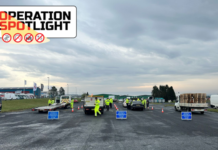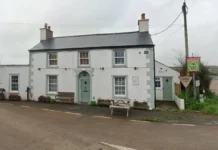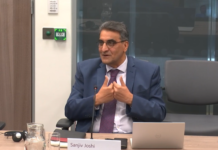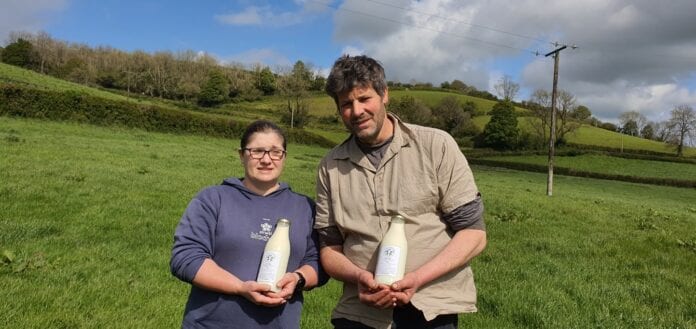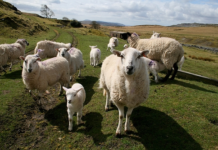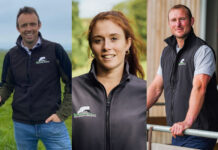Knowing your farmer, being able to ask questions about their produce and how they look after the land is of paramount importance to Ceredigion dairy farming family the Thomas’s. The third generation to farm at Pantfeillionen, Horeb, Llandysul, Ceredigion, are Lyn and Lowri Thomas. Lyn has been farming since he was 16 and celebrates just over 32 years in the industry this year. The family looks after 170 acres and rents a further 100 acres, with the land down to grass. 70 dairy cows, a few sucklers and calves which get sold on as store cattle, call these green hills home.
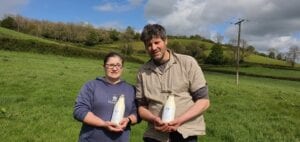
Farming, the couple say, has changed a lot in the last few decades and the industry has moved with the times. The way forward for the family is to maintain the small-scale ethos of the family farm and connect on a personal level with their customers who buy raw milk directly from the farm.
Describing their farming system, Lyn says: “We do all our own silage and everything is done in house. We don’t use a lot of fertilizer, some yes, but we can’t use too much because of the nature of the ground. We’re farming on rock so that means we need to be careful otherwise our grass would burn on the south facing slopes.
“There’s not a lot of topsoil here so we have to use some fertilizer to keep the grass growing but usually no more than a bag an acre is used for silage with some slurry. We don’t go overboard with slurry. Slurry is restricted to about 1700-2000 gallons an acre.”
Lowri adds: “Our earth worm population is very healthy. We try to compost farm yard manure and like to keep it for more than a year, but of course with the new NVZ regulations that won’t be possible going forward. It’s better for the ground if it has been composted for 2 to 3 years but that’s a different story. We try and do things as sustainably as we can here, we don’t buy a lot of stuff in and try to grow what we need ourselves.”
The cows get fed some cake but most of it is milk from grass and silage in the winter, explains Lyn. “We look after our cows, if we don’t look after them -they won’t look after us. We see them every day and if something is wrong then it gets dealt with straight away. The foot trimmer comes in every six weeks, the vet is here monthly for a routine fertility visit where we can chat about the herd’s health at the same. We milk record monthly with NMR, this is when Johne’s testing is done, and we try to keep the cows as healthy as possible. The healthier our cows are, the more productive they are and that also hinges on the health of the environment around them,” he adds.
“We haven’t got a large herd, we know every cow, some even have names thanks to the kids. Because we milk them ourselves, we see them twice a day. They have little groups and we know which cow belongs to which group of friends. They have access to the sheds, all through the year, so they can go in and out as they wish over spring and summer. If they’re coming in we know that’s where they want to be. They have 2 safe places,” explains Lowri.
The family has started a raw milk by the bottle business, which customers can buy directly from the farm. It started with neighbours asking if they could buy some and after a bit of deliberations in 2018 they set up the business, registering with the FSA and local authority, and the ball was set in motion.
“Milk started being sold directly to customers in March 2019 on a small scale and low key way to help build the business up gradually. We know all of our customers, and didn’t install a vending machine on purpose.
“We want to know who our customers are and speak to them and it’s good for them to know who we are as well. It gives us a chance to explain how we farm and look after the environment and the cows. When Covid hit last year, people became more aware of where their food was coming from and what was around them.We picked up more customers through that as well. It’s absolutely fantastic and more and more people now look for local food products, conscious of where their food comes from and how it’s produced,” said Lowri.
Lyn is passionate about the ground that feeds his cows, understanding the direct link between the environment and the health and welfare of the cattle. He says: “ We don’t push the land too much. We farm it sustainably, it gives enough grass for the cows but it’s not overstocked. We could keep more stock but then we’d need more fertilizer and more food for the cows. I’d rather not do that. We have about 0.8 cows per acre here, which is below average. But with more stock to feed, we’d have to reseed the grass more often.
“I haven’t reseeded a field here in 7 years and then it was only because it was old ground when we bought it. It’s still going and we have grass here that’s been going for 25 years. So that’s storing a fair bit of carbon. We aerate the fields, cut slots in to drain the water off and keep fertilizer application to a minimum – it all helps to maintain a healthy environment and soil that stores tonnes of carbon.”
“When the cows come in over the winter, we drip feed the fields with slurry. The first grazing here in March is excellent, the grass is ready to go because it’s been drip fed over the winter. We apply only a small amount every now and then and it works wonders. We’re therefore quite concerned about the NVZ regulations which won’t allow us to carry on looking after the land that way,” Lowri adds.
The wildlife on the farm is plentiful with kites, buzzards, owls, herons, woodpeckers, bats, frogs and foxes, rabbits and badgers as well as deer inhabiting the hedgerows and land that can’t be accessed with hedge cutters.
“There is plenty of undergrowth and habitat here for the wildlife to flourish. We’ve certainly seen an increase in wildlife since the lockdown and it’s a joy to see,” says Lowri.
The family have also planted some trees at the start of the year to fill in gaps in hedgerows. Taking part in a community growing project in Llandysul, Lowri received a surplus of 100 native trees which include oak trees, crab apples, cherry trees, dogwood, willow and birch. Lowri is looking forward to seeing how they grow in years to come.
“We chose random places to plant the trees, mainly where we had gaps in hedges and on ground that’s too wet for the livestock. All of this will provide extra habitats for wildlife in years to come. Blackthorn hedges were also planted along fields that have been amalgamated and will provide wind shelter for the cows and also nesting habitats for farmland birds,” said Lowri.
Lyn and Lowri are proud to produce food and look after the environment they call home but get disheartened with the negative stories surrounding the industry. Lyn says: “A lot of the information put out now is referring to farming on a global level. Large scale and intensive farming. And in some parts of the world that’s true. But our farming systems here in Wales are different – we farm with the environment. You’ve still got your traditional small family farms, looking after the land. Because if you look after the land the land looks after you. That’s an important distinction. People also need to ask where their food comes from and how it’s produced and farmers in Wales have a great story to tell.”
“We’re not very good at telling people how we produce food. I understand how food is produced through my background of being a vet. So when I go into the supermarket and look where the food is coming from – I know what to look for and I distinguish between packaged locally and produced locally. But to be really sure – go to your local butcher, green grocer and small shop or farm shop and that way you can be sure, as a consumer, that your food has been sustainably produced and it’s farmed in harmony with the environment. We’re not horrible people, farmers have been portrayed as polluters and not fit to look after their animals. It’s time we tell them how well we look after our lands and animals,” Lowri said.
Help keep news FREE for our readers
Supporting your local community newspaper/online news outlet is crucial now more than ever. If you believe in independent journalism, then consider making a valuable contribution by making a one-time or monthly donation. We operate in rural areas where providing unbiased news can be challenging. Read More About Supporting The West Wales Chronicle













